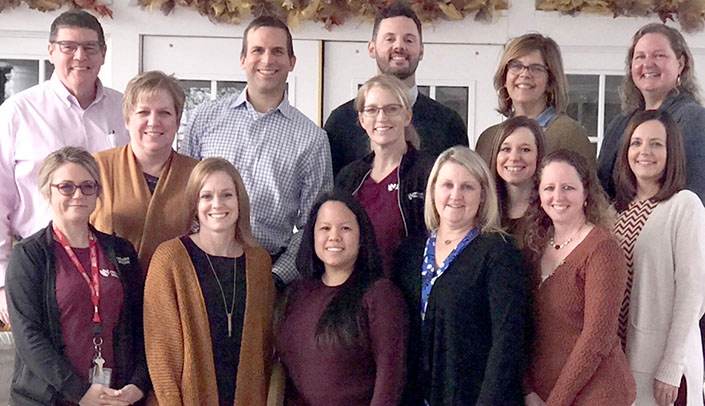Medical breakthroughs never come easy. But, when they occur, the excitement they generate is extra special.
One of the biggest medical breakthroughs of 2019 took place in late October when the Food and Drug Administration approved a new drug (Trikafta) that will benefit 90 percent of cystic fibrosis patients — those with the most common mutation (delta-F508) to the CFTR gene.

Nick Bell with his wife, Kristin
Dramatic results with new drug
Nick Bell is thrilled.
Since he started taking Trikafta, the new drug for cystic fibrosis, about a month ago, he has seen his lung function increase by 19%. He takes two pills in the morning and one pill 12 hours later.
“The new drug is a game-changer. I started noticing a difference in just a few hours,” said Bell, who uses poetry and creative writing to connect with high school students and people in prison. “I have battled shortness of breath my entire life. Now, with the new drug, my shortness of breath has almost completely gone away.
“I’ve always enjoyed working out, but with the shortness of breath, it became much more difficult. The drug has increased my energy and helped me regain my ability to work out.”
Bell, 36, calls Trikafta “a springboard” in elevating his physical fitness. He has been trying to go to the gym four times a week and do 30 minutes of cardio exercises such as running, weightlifting, the elliptical machine and the exercise bike.
Bell and his wife, Kristin, pictured above, celebrated their third wedding anniversary this month. In addition to taking Trikafta, Bell has continued to do his ongoing CF treatment routine, which includes:
- wearing a percussion vest that breaks up the mucus in his lungs – he does this three times a day for between 30 and 45 minutes each time; and
- using a nebulizer, a medical device that turns liquid medications into a mist, which he then inhales. He uses the nebulizer when he is wearing his vest.
Bell encourages all CF patients to continue to do their treatment routine — even if they are showing marked improvement using Trikafta — “until we find out differently.”
“You can’t believe the buzz it created at the national CF meeting in Nashville,” said Peter J. Murphy, M.D, associate professor, internal medicine, and program director of the Adult CF Program in the Nebraska Regional Cystic Fibrosis Center at UNMC/Nebraska Medicine.
CF is an inherited, progressive, life-threatening disease that results in the formation of thick mucus that builds up in the lungs, digestive tract, and other parts of the body. It leads to severe respiratory and digestive problems as well as other complications such as infections and diabetes.
It is a rare disease impacting only 30,000 people in the U.S. and 70,000 worldwide. Approximately 200 CF patients are seen in the UNMC/Nebraska Medicine Adult CF Program and about 165 pediatric patients are followed at Children’s Hospital & Medical Center. The median survival age for people with CF is 47.4 years. In 2000, it was only 32.
Dr. Murphy called Trikafta “an amazing life-changing solution,” but he cautioned, “It’s not curative.
“This is really the cutting edge of science — it’s protein repair,” he said. “It has the potential to significantly change the course of the disease.”
Trikafta, which is manufactured by Vertex Pharmaceuticals in India, was approved by the FDA for people age 12 and older. Clinical trials of the drug showed dramatic improvements in key measures of the disease, including lung function, sweat chloride, and quality of life. One CF patient participated in the Trikafta drug trial at Children’s Hospital & Medical Center.
“It will make a difference in how they feel,” Dr. Murphy said. “The mucus is loosened up, and they will cough less.”
Early returns show that Trikafta is providing CF patients with an average increase of 14% in their lung function — with the biggest gain seen almost immediately in the first month.
Although Trikafta is a monumental breakthrough for 90% of CF patients, that still leaves 10% of patients who won’t benefit from the drug because they don’t have the delta-F508 mutation.
“It’s pretty sobering for this 10%. They feel left out,” said Dr. Murphy, noting that the Cystic Fibrosis Foundation is offering $500 million in grant funding to stimulate new research that will hopefully help all CF patients.
Until another breakthrough comes along, Dr. Murphy and CF patients around the world can at least take a deep breath and celebrate Trikafta.
“It’s astonishing,” he said. “Twenty years ago it would have been unthinkable.”

Great article!!! I'm so proud of both the Adult and Pediatric CF Teams together with the CF Foundation. Great things are happening for CF patients around the world!